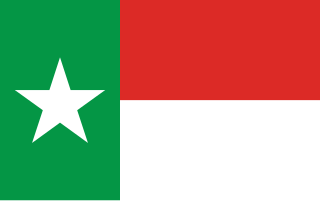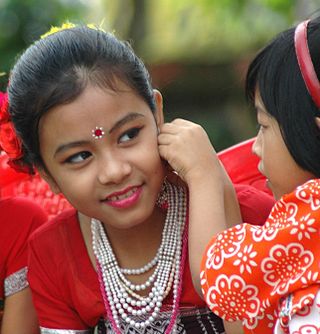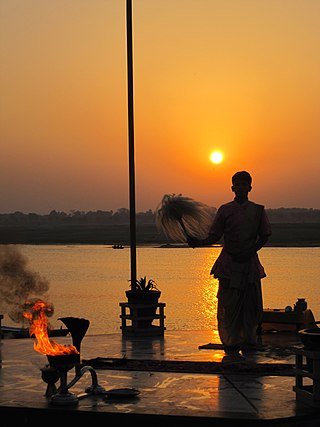
Tripura is a state in Northeast India. The third-smallest state in the country, it covers 10,491 km2 (4,051 sq mi); and the seventh-least populous state with a population of 3.67 million. It is bordered by Assam and Mizoram to the east and by Bangladesh to the north, south and west. Tripura is divided into 8 districts and 23 sub-divisions, where Agartala is the capital and the largest city in the state. Tripura has 19 different tribal communities with a majority Bengali population. Bengali, English and Kokborok are the state's official languages.

The National Liberation Front of Tripura was a banned Christian Tripuri nationalist militant organisation based in Tripura, India. It had an estimated 550 to 850 members.

Kokborok (or Tripuri) is a Tibeto-Burman language of the Indian state of Tripura and neighbouring areas of Bangladesh. Its name comes from kok meaning "verbal" or "language" and borok meaning "people" or "human", It is one of the ancient languages of Northeast India.

The State of Tripura, in northeastern India, has a long history. The Twipra Kingdom at its peak included the whole eastern region of Bengal from the Brahmaputra River in the north and west, the Bay of Bengal in the south and Burma to the east during the 14th and 15th centuries AD.

The Tripuri are a Tibeto-Burman-speaking ethnic group of Bangladesh and Northeast Indian state of Tripura. They are the descendants of the inhabitants of the Twipra/Tripura Kingdom in North-East India and Bangladesh. The Tripuri people through the Manikya dynasty ruled the Kingdom of Tripura for over 600 years starting from 1400 A.D. until the kingdom joined the Indian Union on 15 October 1949. The Tipra Dynasty was established in 590 AD.
The Dances of Tripura refer to several forms of folk dance performed in the state of Tripura in northeastern India. These dances are performed by the Tripuri and Mog peoples, during annual regional celebrations, such as sowing and harvesting festivals.
Kokborok grammar is the grammar of the Kokborok language, also known as Tripuri or Tipra which is spoken by the Tripuri people, the native inhabitants of the state of Tripura. It is the official language of Tripura, a state located in Northeast India.
Reang is one of the Tripuri clan of the Northeast Indian state. The Reangs can be found all over the Tripura state in India. However, they may also be found in Assam and Mizoram. They speak the Reang dialect similar to Kokborok language, which has Tibeto-Burmese roots and is locally known as Kau Bru.
Noatia are one of the Tripuri clan of Tripura state of India. The clan mainly lives in the North Tripura districts of the Tripura state of India. They speak the Noatia dialect of Kokborok which is of Tibeto-Burmese origin.
The Tripura Merger Agreement was the official agreement under which the erstwhile Kingdom of Tripuri joined the state of India.

Rignai is a traditional wrap-around dress worn by Tripuri womenfolk, predominantly in the state of Tripura. It is worn by wrapping it around the waist. It is worn with Risa which is a piece of cloth wrapped around the bust. It is worn by every Tripuri women in homes, workplaces, and particularly occasions.

The Tripuri culture of North-East India has many distinctive features.

Tripuri cuisine is the type of food served in Tripura, in northeastern India. The Tripuri cuisine reflect the organic lifestyle and evolving cultural trend with times from its natural Jhum (Huk) to now settled farming.
The Twipra Kingdom was one of the largest historical kingdoms of the Tripuri people in Northeast India.
Ethnic minorities of Bangladesh or loosely termed indigenous people of Bangladesh are ethnic minorities in Chittagong Hill Tracts (southeastern), Sylhet Division (northeastern), Rajshahi Division (west), and Mymensingh Division (north-central) areas of the country. They are assumed as indigenous and the tribal races, total population of ethnic minorities in Bangladesh was estimated to be over 2 million in 2010. They are diverse ethnic communities including Tibeto-Burman, Austric and Dravidian people.
The Tripuri calendar is the traditional solar calendar used by the Tripuri people, especially in the context of Tripuri irredentism. Its era, the "Twipra Era", "Tripura Era" or Tripurabda is set at 15 April AD 590.

The All Tripura Tiger Force (ATTF) was a Tripuri nationalist militant group active in India's Tripura State. It was founded on 11 July 1990, by a group of former Tripura National Volunteer members under the leadership of Ranjit Debbarma. The ATTF is considered a terrorist organisation by India. According to the South Asian Terrorism Portal, approximately 90% of the ATTF's administration are Hindu and the rest are Christians. The group was said to have been formed as the armed wing of the National Liberation Front of Tripura (NLFT) but split into its own organization. The group was headquartered in Tarabon in Bangladesh.
Tripuri Nationalism is an ideology that supports self-determination by the Tripuri people. The conflict is in essence ethnic and the Tripuri community, indigenous to the region formed the clear majority of population in the princely state of Tippera, which joined the Republic of India in 1949 as the state of Tripura.

The culture of Tripura is distinct and a bit similar to other people of Northeast India. However like Assam, Manipur, Burma and Southeast Asia culture of Tripura is characterized in small portion where people live in plain and hill areas. Tripura is a state in North East India. In the 2001 census of India, Bengalis represented almost 70% of the population and the Tripuri population comprised 30% of Tripura's population. The Tripuri population comprises some clans and ethnic groups with diverse languages and cultures. The largest native group was the Tripuri who had a population of 543,848 in 2001 census, representing 16.99% of the state population and 54.7% of the scheduled tribe population. The other group of people in order of decreasing population were Chakma (6.5%), Halam (4.8%), Mog (3.1%), Munda, Kuki tribes and Garo Hajong. Bengali is the most spoken language, due to the dominance of Bengali people in the state. Kokborok (Tripuri/Tiprakok) is a common language among Tripuris and lingua franca in Tripura. Several other languages belonging to Indo-European and Sino-Tibetan families are spoken by the different tribe

Ganga puja is a religious festival of the northeastern state of Tripura in India. The tribal Tripuri people worship the Goddess of the river, and pray to be saved from epidemic diseases and for the well-being of pregnant women. The celebration involves building a temple of bamboo in the middle of the river or a water stream. The River Ganges, known locally as Ganga, is one of the fourteen prime deities worshipped in this region. The festival is popularly celebrated throughout the state. The festival is popularly celebrated throughout the state somewhere in March, April or May, with its date fixed according to the Hindu Lunisolar calendar.









